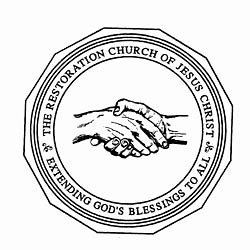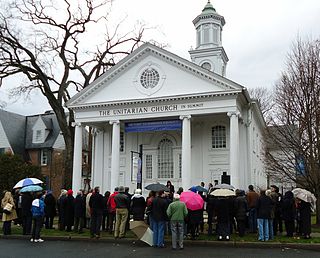Within Christianity, there are a variety of views on sexual orientation and homosexuality. The view that various Bible passages speak of homosexuality as immoral or sinful emerged in the first millennium AD, and have since become entrenched in many Christian denominations through church doctrine and the wording of various translations of the Bible.

Heterosexuality is romantic attraction, sexual attraction or sexual behavior between people of the opposite sex or gender. As a sexual orientation, heterosexuality is "an enduring pattern of emotional, romantic, and/or sexual attractions" to people of the opposite sex; it "also refers to a person's sense of identity based on those attractions, related behaviors, and membership in a community of others who share those attractions." Someone who is heterosexual is commonly referred to as straight.
The subject of homosexuality and Judaism dates back to the Torah. The book of Vayikra (Leviticus) is traditionally regarded as classifying sexual intercourse between males as a to'eivah that can be subject to capital punishment by the current Sanhedrin under halakha.
The relationship between religion and homosexuality has varied greatly across time and place, within and between different religions and denominations, with regard to different forms of homosexuality and bisexuality. The present-day doctrines of the world's major religions and their denominations differ in their attitudes toward these sexual orientations. Adherence to anti-gay religious beliefs and communities is correlated with the prevalence of emotional distress and suicidality in sexual minority individuals, and is a primary motivation for seeking conversion therapy.

The United Church of Canada is a mainline Protestant denomination that is the largest Protestant Christian denomination in Canada and the second largest Canadian Christian denomination after the Catholic Church in Canada.

The Uniting Church in Australia (UCA) was founded on 22 June 1977, when most congregations of the Methodist Church of Australasia, about two-thirds of the Presbyterian Church of Australia and almost all the churches of the Congregational Union of Australia united under the Basis of Union. According to the church, it had 243,000 members in 2018. In the 2016 census, about 870,200 Australians identified with the church; in the 2011 census, the figure was 1,065,796. The UCA is Australia's third-largest Christian denomination, behind the Catholic and the Anglican Churches. There are around 2,000 UCA congregations, and 2001 National Church Life Survey (NCLS) research indicated that average weekly attendance was about 10 per cent of census figures.
Since the 1990s, the Anglican Communion has struggled with controversy regarding homosexuality in the church. In 1998, the 13th Lambeth Conference of Anglican bishops passed a resolution "rejecting homosexual practice as incompatible with Scripture". However, this is not legally binding. "Like all Lambeth Conference resolutions, it is not legally binding on all provinces of the Communion, including the Church of England, though it commends an essential and persuasive view of the attitude of the Communion." "Anglican national churches in Brazil, South Africa, South India, New Zealand and Canada have taken steps toward approving and celebrating same-sex relationships amid strong resistance among other national churches within the 80 million-member global body. The Episcopal Church in the U.S. has allowed same-sex marriage since 2015, and the Scottish Episcopal Church has allowed same-sex marriage since 2017." In 2017, clergy within the Church of England indicated their inclination towards supporting same-sex marriage by dismissing a bishops' report that explicitly asserted the exclusivity of church weddings to unions between a man and a woman. At General Synod in 2019, the Church of England announced that same-gender couples may remain recognised as married after one spouse experiences a gender transition. In 2023, the Church of England announced that it would authorise "prayers of thanksgiving, dedication and for God's blessing for same-sex couples."

The Metropolitan Community Church (MCC), also known as the Universal Fellowship of Metropolitan Community Churches (UFMCC), is an international LGBT-affirming mainline Protestant Christian denomination. There are 222 member congregations in 37 countries, and the fellowship has a specific outreach to lesbian, gay, bisexual and/or transgender families and communities.
The blessing or wedding of same-sex marriages and same-sex unions is an issue about which leaders of Christian churches are in ongoing disagreement. Traditionally, Christianity teaches that homosexual acts are sinful and that holy matrimony can only exist between two persons of different sexes. These disagreements are primarily centred on the interpretation of various scripture passages related to homosexuality, sacred tradition, and in some churches on varying understandings of homosexuality in terms of psychology, genetics and other scientific data. While numerous church bodies have widely varying practices and teachings, individual Christians of every major tradition are involved in practical (orthopraxy) discussions about how to respond to the issue.

The Reconciling Ministries Network (RMN) is an organization seeking the inclusion of people of all sexual orientations and gender identities in both the policy and practices of United Methodist Church. It is one of many Welcoming Congregation organizations to emerge in American Christianity in the 1980s. The ministry has over 1100 affiliated congregations and 42,000 affiliated individuals.

The Restoration Church of Jesus Christ (RCJC), based in Salt Lake City, Utah, was a church in the Latter Day Saint movement that catered primarily to the spiritual needs of LGBT Latter Day Saints. It was founded in 1985 and was dissolved 25 years later in 2010.

Unitarian Universalism, as practiced by the Unitarian Universalist Association (UUA), and the Canadian Unitarian Council (CUC), is a non-Creedal and Liberal theological tradition and an LGBTQ affirming denomination.
Attitudes in Presbyterianism toward homosexuality vary, ranging from outright condemnation to complete acceptance.
Methodist viewpoints concerning homosexuality are diverse because there is no one denomination which represents all Methodists. The World Methodist Council, which represents most Methodist denominations, has no official statements regarding sexuality. British Methodism holds a variety of views, and permits ministers to bless same-gender marriages. United Methodism, which covers the United States, the Philippines, parts of Africa, and parts of Europe, concentrates on the position that the same-sex relations are incompatible with "Christian teaching", but extends ministry to persons of a homosexual orientation, holding that all individuals are of sacred worth.
Many views are held or have been expressed by religious organisation in relation to same-sex marriage. Arguments both in favor of and in opposition to same-sex marriage are often made on religious grounds and/or formulated in terms of religious doctrine. Although many of the world's religions are opposed to same-sex marriage, the number of religious denominations that are conducting same-sex marriages have been increasing since 2010. Religious views on same-sex marriage are closely related to religious views on homosexuality.
The ordination of lesbian, gay, bisexual and/or transgender (LGBT) clergy who are open about their sexuality or gender identity; are sexually active if lesbian, gay, or bisexual; or are in committed same-sex relationships is a debated practice within some contemporary Christian denominations.
The first openly lesbian, gay, bisexual, and transgender clergy in Judaism were ordained as rabbis and/or cantors in the second half of the 20th century.
Lesbian, gay, bisexual, transgender (LGBT) affirming denominations in Judaism are Jewish religious groups that welcome LGBT members and do not consider homosexuality to be a sin. They include both entire Jewish denominations, as well as individual synagogues. Some are composed mainly of non-LGBT members and also have specific programs to welcome LGBT people, while others are composed mainly of LGBT members.






